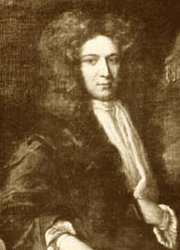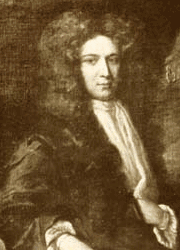In philosophy, Collins leads the defence of Necessarianism.. His assertion that it is self-evident that nothing that has a beginning can be without a cause was attacked in an elaborate treatise by Samuel Clarke. 'Vindication of the Divine Attributes' (1710); 'Priestcraft in Perfection' (1709) were oher examles of his work.
Collins became known as one of the best read men in England, amaasing a private library of some 6,906 books on all subjects, but particularly favoring works on history, theology, and philosophy. He died at his house in Harley Street, London.
''''''''''''''''
Extra from the Cambridge Alumni index for this man:
Admitted at a College, fellow-commoner, the first of the three ranks in which students were matriculated. Fellowship-Com. at KING'S, 1693. Son of Henry. Born at Isleworth, or Heston, Middlesex, June 21, 1676. School, Eton. Adm. at the Middle Temple, Nov. 24, 1694; and perhaps at Lincoln's Inn, 1708. Married, 1698, Martha, dau. of Sir Francis Child. After visits to Holland he settled at Baddow, Essex, 1715. J.P., and deputy-lieutenant for Essex. The well-known deist. Author of the Discourse of Freethinking. Died at Baddow Hall, Dec. 13, 1729. Buried in Oxford Chapel (now St Peter's, Vere St). (D.N.B.)
In philosophy, Collins leads the defence of Necessarianism.. His assertion that it is self-evident that nothing that has a beginning can be without a cause was attacked in an elaborate treatise by Samuel Clarke. 'Vindication of the Divine Attributes' (1710); 'Priestcraft in Perfection' (1709) were oher examles of his work.
Collins became known as one of the best read men in England, amaasing a private library of some 6,906 books on all subjects, but particularly favoring works on history, theology, and philosophy. He died at his house in Harley Street, London.
''''''''''''''''
Extra from the Cambridge Alumni index for this man:
Admitted at a College, fellow-commoner, the first of the three ranks in which students were matriculated. Fellowship-Com. at KING'S, 1693. Son of Henry. Born at Isleworth, or Heston, Middlesex, June 21, 1676. School, Eton. Adm. at the Middle Temple, Nov. 24, 1694; and perhaps at Lincoln's Inn, 1708. Married, 1698, Martha, dau. of Sir Francis Child. After visits to Holland he settled at Baddow, Essex, 1715. J.P., and deputy-lieutenant for Essex. The well-known deist. Author of the Discourse of Freethinking. Died at Baddow Hall, Dec. 13, 1729. Buried in Oxford Chapel (now St Peter's, Vere St). (D.N.B.)
Gravesite Details
This is a memorial plaque only. His remains were buried at Oxford Chapel (later called St Peter, Vere Street).
Advertisement
Records on Ancestry
Sponsored by Ancestry
Advertisement



